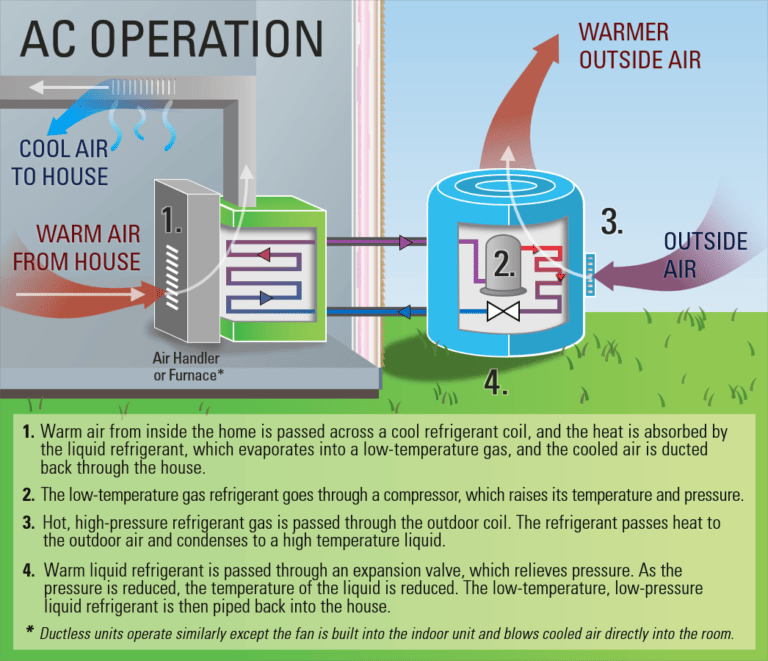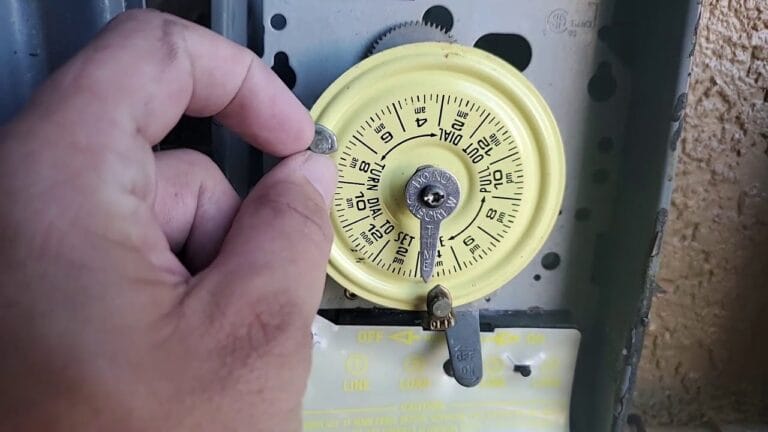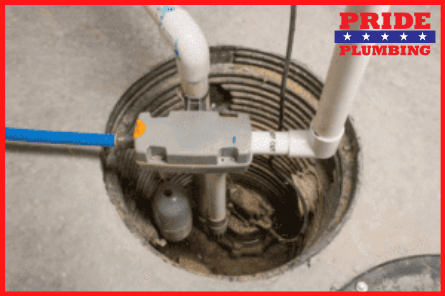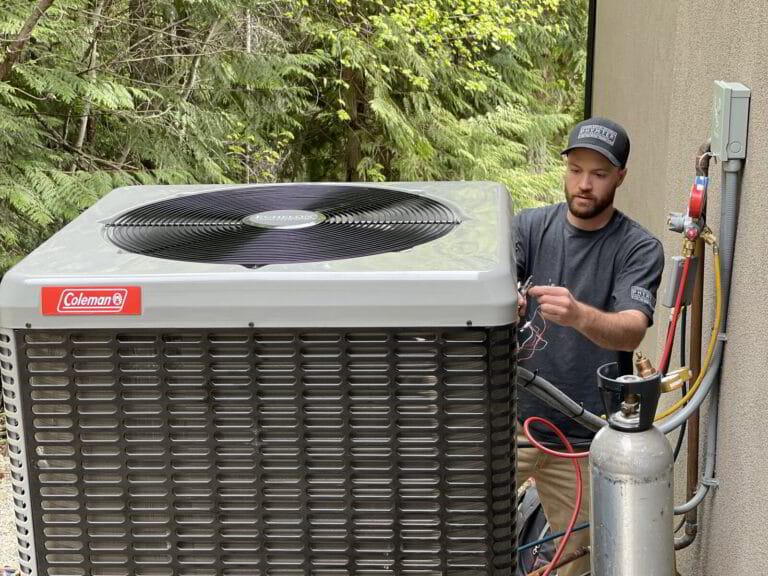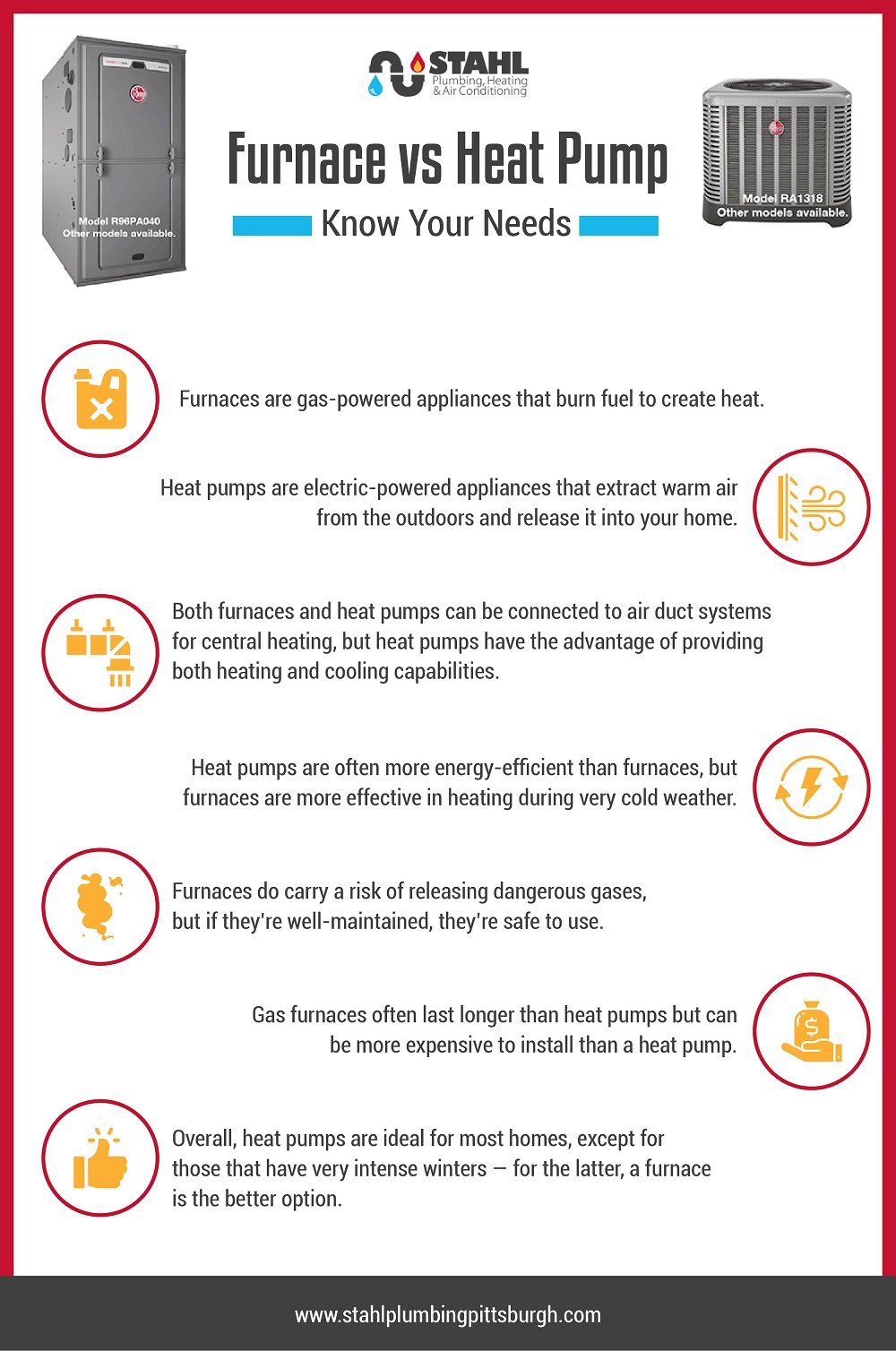
Hey there! Are you trying to decide between a heat pump and a gas furnace for your home? Well, you’ve come to the right place! In this article, we’ll explore the pros and cons of heat pumps and gas furnaces so you can make an informed decision.
If you’re wondering which option is right for you, this guide will break it down in a simple and easy-to-understand way. We’ll delve into the benefits and drawbacks of both heat pumps and gas furnaces, giving you the knowledge you need to choose the best heating solution for your needs.
So, whether you’re looking to save on energy costs, reduce your carbon footprint, or maximize comfort in your home, let’s dive in and explore the pros and cons of heat pumps and gas furnaces.
Are you trying to decide between a heat pump and a gas furnace? Let’s weigh the pros and cons to help you make an informed decision. When it comes to efficiency, heat pumps are more energy-efficient, while gas furnaces provide higher heating capacity. Heat pumps excel in providing both heating and cooling, whereas gas furnaces only offer heating. Heat pumps are more environmentally friendly, while gas furnaces have lower installation costs. Consider your specific needs and priorities to determine which option is right for you.
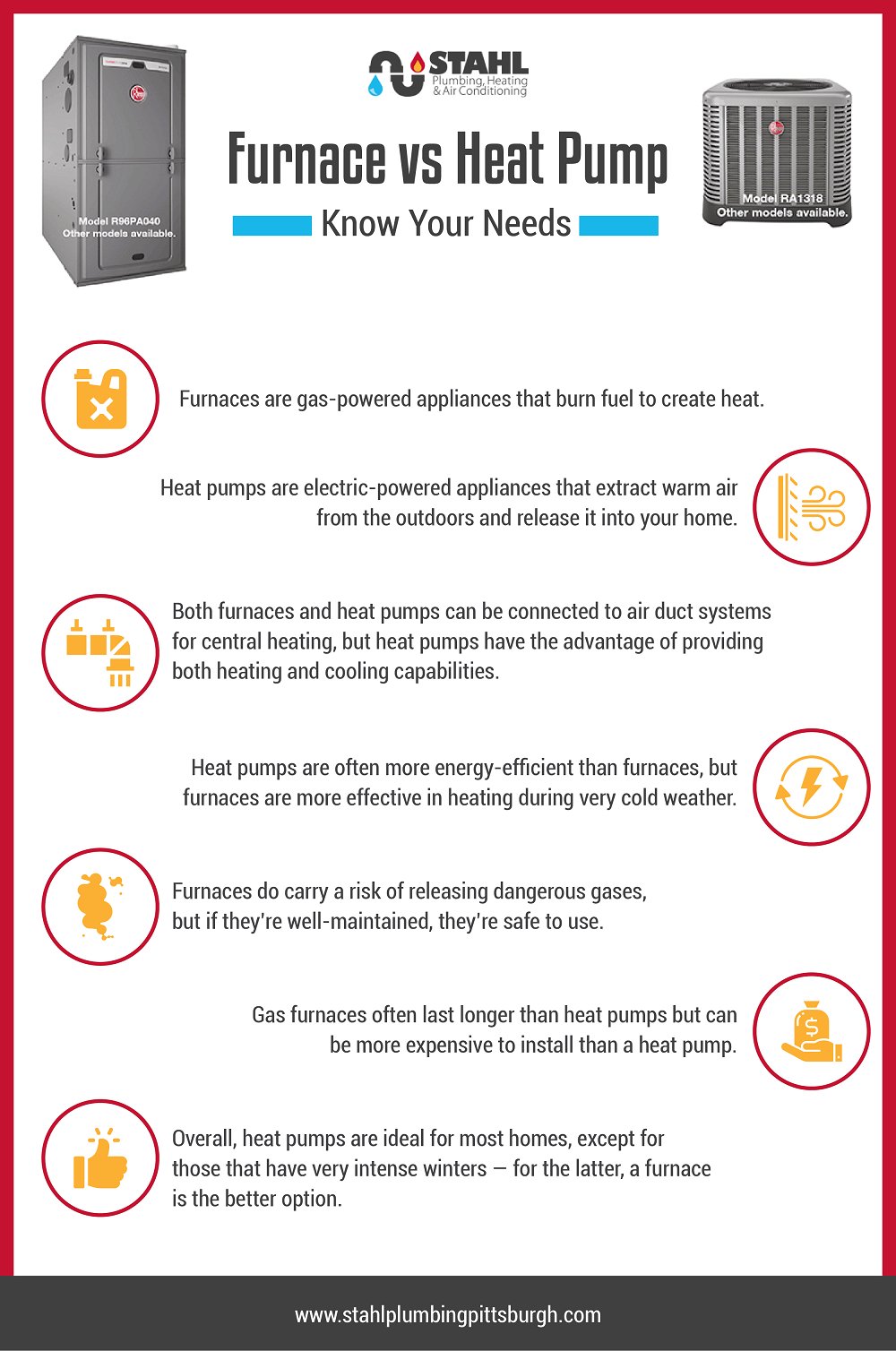
Pros And Cons Of Heat Pump Vs Gas Furnace: Get To Know Which Is Right For You?
When it comes to heating your home, choosing between a heat pump and a gas furnace is a crucial decision. Both options have their own set of advantages and disadvantages, so it’s important to understand the differences before making a choice. In this article, we will explore the pros and cons of heat pumps and gas furnaces to help you determine which option is the right fit for your needs.
The Benefits of Heat Pumps
Heat pumps offer several benefits that make them an attractive option for homeowners. Firstly, they are highly energy efficient. Unlike gas furnaces, heat pumps transfer heat from the outside air or ground to warm your home, rather than generating heat directly. This results in a significant reduction in energy consumption and lower utility bills. Additionally, heat pumps provide both heating and cooling capabilities, making them a versatile choice for year-round comfort.
Another advantage of heat pumps is their environmental friendliness. Since they do not burn fossil fuels, their carbon footprint is significantly lower compared to gas furnaces. This can contribute to reducing greenhouse gas emissions and promoting a more sustainable living environment. Additionally, heat pumps operate quietly, making them ideal for noise-sensitive environments.
One of the main benefits of heat pumps is that they are safer than gas furnaces. Heat pumps do not involve combustion, meaning there is no risk of gas leaks or carbon monoxide poisoning, which can be a serious concern with gas furnaces. This makes heat pumps a safer option, especially for households with children or pets.
The Drawbacks of Heat Pumps
While heat pumps have numerous benefits, they also have some drawbacks to consider. One limitation is their performance in extreme cold temperatures. Heat pumps become less efficient as the outdoor temperature drops, and they may struggle to provide sufficient heat in very cold climates. In these situations, supplemental heating sources may be required to maintain comfort levels.
Another potential disadvantage is the higher upfront cost of heat pumps compared to gas furnaces. Heat pumps are generally more expensive to purchase and install, which can be a deterrent for homeowners on a tight budget. However, it’s important to consider the long-term savings in energy costs that can offset the initial investment.
Lastly, heat pumps require regular maintenance to ensure optimal performance. This includes cleaning or replacing filters, inspecting coils, and checking refrigerant levels. While regular maintenance is essential for any HVAC system, failing to properly maintain a heat pump can result in decreased efficiency and increased energy consumption.
The Pros of Gas Furnaces
Gas furnaces have their own set of advantages that make them a popular choice for heating in many households. One of the main benefits is their ability to provide consistent and reliable heat, even in extremely cold temperatures. Gas furnaces can quickly heat up a space and maintain a desired temperature with ease, making it suitable for colder climates.
In terms of cost, gas furnaces have a lower upfront investment compared to heat pumps. The cost of natural gas is typically lower than electricity, which can lead to lower monthly heating expenses. Additionally, gas furnaces tend to have a longer lifespan compared to heat pumps, which can result in fewer frequent replacements and repairs over time.
Gas furnaces are also known for their powerful heating capacity. They can quickly heat up large spaces and provide a high level of heat output, making them ideal for larger homes or commercial buildings. If instant warmth and a fast response time are important to you, a gas furnace may be the right choice.
The Cons of Gas Furnaces
While gas furnaces offer many advantages, there are also some drawbacks to consider. One of the main concerns with gas furnaces is their environmental impact. The combustion process releases greenhouse gases and contributes to air pollution. This can have negative consequences for both the environment and human health, especially in areas with poor air quality.
Another downside of gas furnaces is the potential safety risks associated with burning natural gas. Gas leaks can occur, increasing the risk of fire or explosion. Carbon monoxide is also a byproduct of combustion, and if not properly ventilated, it can pose a serious risk of poisoning. Regular maintenance and annual inspections are crucial to ensure the safe operation of a gas furnace.
In terms of energy efficiency, gas furnaces are generally less efficient compared to heat pumps. They convert a smaller percentage of the energy from natural gas into usable heat, resulting in higher energy consumption and increased utility bills. This can be a disadvantage for environmentally conscious homeowners or those looking to reduce their energy costs.
Key Takeaways: Pros And Cons Of Heat Pump Vs Gas Furnace – Which Is Right For You?
- Both heat pumps and gas furnaces have their advantages and disadvantages.
- Heat pumps are more energy-efficient and can provide both heating and cooling, but they may struggle in extremely cold climates.
- Gas furnaces are powerful and reliable, especially in colder regions, but they can be less efficient and produce greenhouse gas emissions.
- Consider your climate, energy costs, and long-term savings when choosing between a heat pump and a gas furnace.
- If you live in a mild climate and prioritize energy efficiency, a heat pump might be the right choice. If you live in a colder region and need powerful heating, a gas furnace could be the better option.
Frequently Asked Questions
Are you torn between choosing a heat pump or a gas furnace for your home? Let’s explore the pros and cons of each option to help you decide which is right for you.
1. How does a heat pump work, and what are its advantages?
A heat pump works by transferring heat from the outside air or ground into your home, providing both heating and cooling capabilities. One advantage of a heat pump is its high energy efficiency, as it moves heat rather than generating it. This means lower energy bills and reduced environmental impact. Heat pumps also offer the added benefit of dehumidifying your home during summer months.
However, it’s important to note that the efficiency of a heat pump decreases as temperatures drop below freezing. In colder climates, a secondary heating source may be necessary. Additionally, heat pumps typically have a higher upfront cost compared to gas furnaces.
2. What are the benefits of a gas furnace?
A gas furnace uses natural gas or propane to generate heat, which is then distributed throughout your home via ductwork. One major advantage of a gas furnace is its ability to provide consistent and powerful heat, regardless of outdoor temperatures. Gas furnaces also tend to have a lower upfront cost compared to heat pumps, making them an attractive option for budget-conscious homeowners.
However, it’s worth noting that gas furnaces are not as energy-efficient as heat pumps, resulting in higher energy bills. They also produce greenhouse gas emissions, contributing to climate change. Additionally, gas furnaces require regular maintenance, such as cleaning and inspecting the burner and flue, to ensure safe and efficient operation.
3. Which option is better for cold climates?
In extremely cold climates, a gas furnace is generally considered a better option. Gas furnaces can provide consistent and powerful heat even in freezing temperatures, making them suitable for areas with harsh winters. Heat pumps, on the other hand, may struggle to maintain efficient operation in very cold conditions, leading to reduced heating capacity.
However, advancements in technology have made heat pumps more capable of performing well in colder climates than in the past. If you live in a cold climate and are considering a heat pump, it’s essential to choose a model specifically designed for cold weather conditions and consider having a backup heating system in place for extremely frigid days.
4. Which option is more environmentally friendly?
When it comes to environmental impact, heat pumps are generally considered more eco-friendly than gas furnaces. Heat pumps use electricity to transfer heat, which can be produced from renewable energy sources. They do not produce direct emissions on-site, contributing to a lower carbon footprint. On the other hand, gas furnaces burn fossil fuels and emit greenhouse gases into the atmosphere, contributing to climate change.
That being said, the environmental impact of heat pumps can vary depending on the source of electricity in your area. If your electricity comes from fossil fuel power plants, the overall environmental benefit may be reduced. It’s important to consider the energy mix in your region when evaluating the environmental impact of different heating options.
5. Can I use both a heat pump and a gas furnace in my home?
Yes, it is possible to use both a heat pump and a gas furnace in what is known as a dual-fuel system. In this setup, the heat pump provides efficient heating and cooling during moderate temperatures, and the gas furnace kicks in during extremely cold weather. A dual-fuel system allows for optimal energy efficiency and comfort by utilizing the strengths of both systems.
However, it’s important to note that installing a dual-fuel system requires additional equipment and can be more costly upfront. It also requires a thermostat that can automatically switch between the heat pump and gas furnace based on outdoor temperature conditions. Consulting with an HVAC professional is recommended to determine if a dual-fuel system is suitable for your home.
Summary
Now that we’ve explored the pros and cons of heat pumps and gas furnaces, let’s recap.
Heat pumps are efficient and eco-friendly, but they may struggle in extreme temperatures. Gas furnaces provide reliable heat, but they require a constant fuel supply.
When choosing between the two, consider your climate, budget, and environmental impact. Both options have their benefits and drawbacks, so weigh them carefully to find the right fit for your home.


